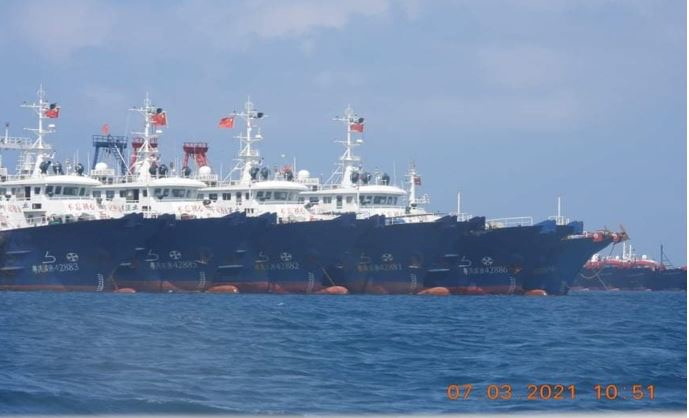MANILA (Reuters) - The Philippines complained to China on Monday about what it called a "swarming and threatening presence" of Chinese vessels in disputed waters in the South China Sea and demanded they be withdrawn from the area.
Philippine officials reported about 220 vessels, believed to be manned by Chinese maritime militia personnel, were seen anchored at the Whitsun Reef, which Manila calls the Julian Felipe Reef, on March 7.
The Chinese Embassy in Manila said they were fishing vessels taking shelter from rough seas.
"The continued deployment, lingering presence and activities of Chinese vessels infringe upon Philippine sovereignty," the Philippine foreign ministry said in a diplomatic protest, adding "their swarming and threatening presence creates an atmosphere of instability."
The Chinese Embassy rejected the accusations.
"There is no Chinese maritime militia as alleged. Any speculation as such helps nothing but causes unnecessary irritation," it said in a statement.
Philippines Defence Secretary Delfin Lorenzana called the presence of militia vessels a "clear provocative action of militarising the area" and urged China to recall them.
The U.S. Embassy said the Chinese boats had been mooring in the area for many months in increasing numbers, regardless of the weather.In a tweet, State Department spokesman Ned Price said Washington "stands with our ally, the Philippines, regarding concerns about the gathering of (Chinese) maritime militia vessels near Whitsun Reef.
"We call on Beijing to stop using its maritime militia to intimidate and provoke others, which undermines peace and security," he said.
An international tribunal invalidated China's claim to 90% of the South China Sea in 2016, but Beijing does not recognise the ruling and has built islands in disputed waters equipped with radar, missiles batteries and hangers for fighter jets.
Jay Batongbacal, a South China Sea expert at the University of the Philippines, said President Rodrigo Duterte's "friendship policy" to move away from Washington and align more closely with China was to blame for the incursions.

"Whatever opportunities there were for us to slow them down or stop them they have been lost," Batongbacal said.